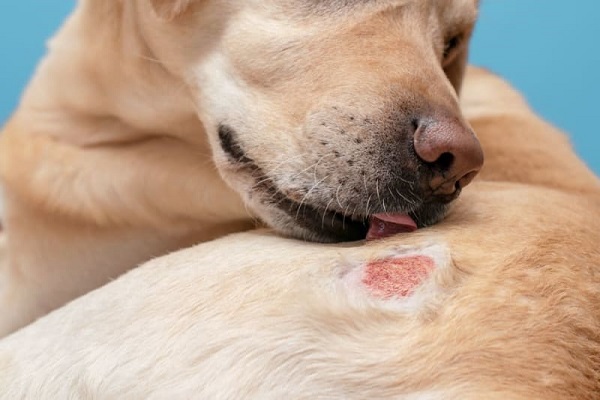Free Reasons On Deciding On Kidney Failure In Dogs
Wiki Article
How Can Probiotics Help With Skin Allergies In Dogs And Cats?
Probiotics can play a significant role in reducing and preventing allergies to the skin in dogs and cat. Probiotics are beneficial bacteria that ensure a healthy microbiome within the gut, which supports the skin and immune health. Probiotics can reduce the severity of skin allergies in dogs:
Immune System Regulation
Balanced Immune Reaction:
Function: Probiotics help regulate the immune system. They do this by encouraging the development of healthy bacteria as well as inhibiting the growth harmful bacteria.
Benefits: An immune system that is well-balanced can help reduce hypersensitivity that can cause allergies. This reduces the frequency and severity of allergic reactions in pets.
Inflammation Reduction
Anti-inflammatory Effects:
Function: Certain probiotic strains can create anti-inflammatory compounds and modulate the body's response to inflammation.
Benefits: Through reducing overall inflammation, probiotics are able to alleviate the inflammation and itching associated with skin allergies, which can lead to healthier skin.
Gut-Skin Axis
Improved Gut Health
The gut-skin connection is one of the terms that describes the relationship between skin health and gut health. Probiotics improve gut barrier function and overall digestion health.
Benefits: Healthy gut can stop the leakage of toxins and allergens into bloodstreams which could trigger skin reactions. It also helps reduce the symptoms of skin allergy.
Strengthening Skin Barrier
The Enhanced Skin Barrier feature:
Function: Probiotics possess the ability to influence the production and distribution of ceramides as well as other lipids essential for maintaining a strong skin barrier.
Benefits A more robust skin barrier helps to protect against allergens from the environment. This reduces skin infections and allergic reaction.
Allergy Symptom Management
Treatment of Symptoms:
Function: By modulating the release of histamines as well as other chemicals involved in allergic reactions, probiotics can help manage symptoms.
Benefits: It reduces the itching, irritation, and discomfort caused by allergies to the skin in pets.
A heightened diversity of microbes
More microbial diversity:
Function: Probiotics increase the diversity of the gut microbiome. It is vital for an optimal response to your immune system.
Benefits A microbial community that is diverse can enhance general health as well as skin health, by preventing the growth of bacteria that can cause allergies.
Specific Probiotic strains
Lactobacillus, Bifidobacterium and other probiotics have been proven to help manage skin allergies.
Lactobacillus Rhamnosus GG: It is renowned for its role in improving digestive health and reducing the symptoms of allergies.
Bifidobacterium helps in reducing inflammation and improvement of immune system.
Use Factors
Dosage: The dosage of probiotics will be determined by the size of the pet, its weight and the health needs of your pet. Follow the instructions on the label, or those provided by your veterinarian.
Formulations: There are many varieties of probiotics available for your pet, including capsules or powders. Selecting a high-quality pet-specific product is vital for security and effectiveness.
Monitoring and Side effects Although probiotics are considered safe in general, it is important to monitor your pet for adverse reactions such as gastrointestinal upset. Beginning with a lower dose and increasing it gradually to minimize side reactions.
Conclusion
By controlling the immunity system, reducing swelling, improving skin barrier and overall digestive health, probiotics aid in managing skin allergies. Regular use of probiotics may result in a decrease in allergy symptoms, promoting healthy skin and a higher overall quality of life for pets. Read the most popular kidney failure in cats for more advice including pet urinary tract supplements, herbal supplements for cats, pet immune system supplements, pet supplements for pets with fear of dental work, australian-made pet products, pet supplements for puppies and kittens, pet supplements for pets with diabetes, pet supplements for puppies and kittens and more.

Coconut Oil Helps With Allergies For Cats And Dogs.
Coconut oil is moisturizing, antimicrobial and healing properties. It is a great option to treat skin allergies. Coconut oil is a great remedy for pets suffering from allergies to the skin.
Moisturizing Properties
Hydration of the skin:
Coconut oil easily penetrates and is a great moisturizer.
Benefits: It helps to hydrate dry, flaky skin, providing relief from itching and encouraging a healthier skin barrier. This is particularly beneficial for pets suffering from dermatitis allergic that can result in dry, itchy skin.
Anti-inflammatory Action
Reduce Inflammation
Coconut oil is a source of a chemical called lauric Acid. This acts as an anti-inflammatory.
Coconut oil can be a fantastic way to reduce the swelling and redness caused by allergies. This may provide relief to pets that are experiencing allergies.
Antimicrobial Activities
Combating Infections
The function: Coconut oil contains antimicrobial properties, such as caprylic and lauric acids, which aid in fighting bacteria and viruses, fungi and many other microorganisms.
Coconut oil can be beneficial in treating secondary skin infection which can result from irritations or scratches caused by allergies. It improves overall skin health by preventing the development of further issues.
Soothing and healing
Promoting Healing
Coconut oil is a natural healing agent for skin.
Benefits. It can help reduce minor cuts and abrasions or abrasions. This helps accelerate the healing process of the skin injuries caused by allergies.
Barrier Protection
Enhancing Skin Barrier:
Coconut oil helps strengthen the natural barrier to the skin.
Benefits: A stronger skin barrier decreases allergic reactions as well as the risk of infection.
Dietary Supplements
Internal Benefits
Coconut oil is a good choice to take orally to supplement a diet.
Consumed, it aids in maintaining overall general health of the skin. Anti-inflammatory and antimicrobial benefits can decrease swelling throughout the body and boost the immune system in animals, thereby lessening allergies to the skin.
Usage and Considerations
Topical Application Coconut oil can be applied directly to the area of the skin. Massage the coconut oil with gentle pressure until it absorbs. You can do this once or twice a day depending on how serious the skin condition is.
Coconut oil added to your pet's food is a natural supplement that can be taken orally. A typical dosage is about 1 teaspoon per 10 pounds of body weight, however, it is important to begin with a smaller amount and gradually increase it to avoid gastrointestinal upset.
Quality of Coconut Oil: Use high-quality organic, natural, virgin coconut oil to ensure that it is free from preservatives and additives.
Be on the lookout for reactions. Coconut oil is generally considered safe for pets, be sure to watch for any reactions.
If you'd like to learn more about this topic Please click here.
Coconut oil is beneficial as a natural remedy to treat skin allergies in dogs and cats. Its moisturizing properties, anti-inflammatory, antibiotic, and healing properties can help soothe and protect the face as well as reduce swelling and itching and boost overall good health of the skin. Regularly applying coconut oil, applied topically and as a dietary supplement, can give significant relief from allergy symptoms and enhance the quality of life of pets suffering from skin allergies. View the top see post on probiotics for dogs for website tips including pet echinacea supplements, pet hip supplements, pet supplements for senior pets, yeast infections in dogs, pet supplements for pets with special needs, natural cat supplements, pet ginger supplements, pet omega-3 supplements and more.

Oregano Oil Is A Remedy To Treat Yeast Infections In Dogs As Well As Cats.
Oregano is often used to treat yeast illnesses in dogs and cats because of its powerful antimicrobial properties. This oil is especially well against fungi like Candida. Here's how oregano oil can aid in treating yeast infections:
Antifungal Properties
Active Compounds:
Oregano oil is an effective antimicrobial which contains carvacrol and Thymol.
Benefits : These compounds block the growth fungi and Candida species that cause yeast-related infections.
Antimicrobial Activity
Broad-Spectrum Action:
Oregano essential oil is known to have broad antimicrobial properties against various pathogens, such as fungi and bacteria.
Benefits: Its ability to target fungal overgrowth helps to reduce yeast infections in dogs and cats, particularly in areas such as the skin and ears.
Anti-inflammatory action
Inflammation reduction:
Oregano Oil has anti-inflammatory properties which can reduce symptoms such as itching and redness.
Benefits - Oregano Oil can reduce inflammation and provide relief to irritated mucous membranes and skin.
Support Immune Function
Immune Modulation:
Oregano oils help to support the immune function of the body by strengthening the body's natural defenses.
Benefits: A stronger immune system can help you fight off a yeast infection and stop it from returning.
Use and Considerations
Topical application Mix oregano with some carrier oil like coconut or olive oil prior to applying topically. The typical ratio of dilution is 1-2 drops of oregano for a tablespoon of carrier oil.
Avoid ingestion. Oregano is extremely concentrated. It shouldn't be consumed by pets without the supervision of a veterinarian, since it can be poisonous in large quantities.
Patch Test: Before using the cream on large areas do a skin patch test to determine if the product causes any reaction.
Consultation with Veterinarian. Always consult with your vet prior to applying the oregano oils to treat yeast infections. They can advise you on proper dilution techniques, methods of application and possible risks based on your pet's specific health issues.
Conclusion
Oregano oil's antibacterial properties can make it a natural treatment for yeast infections in cats and dogs. The ability of oregano oil to ease inflammation and control yeast infections is due to its antimicrobial qualities. Use it with caution and under the guidance of a vet to ensure that your pet's health is secure and efficient. It is crucial to follow the guidelines of a veterinarian when you use oregano in the complete treatment regimen for yeast infections in pets. Have a look at the best helpful resource for petz park for blog advice including pet eye supplements, pet pregnancy supplements, organic pet supplements, pet supplements for working dogs, pet supplements for pets with skin ulcers, pet supplements for pets with separation anxiety, pet collagen supplements, pet memory supplements and more.
